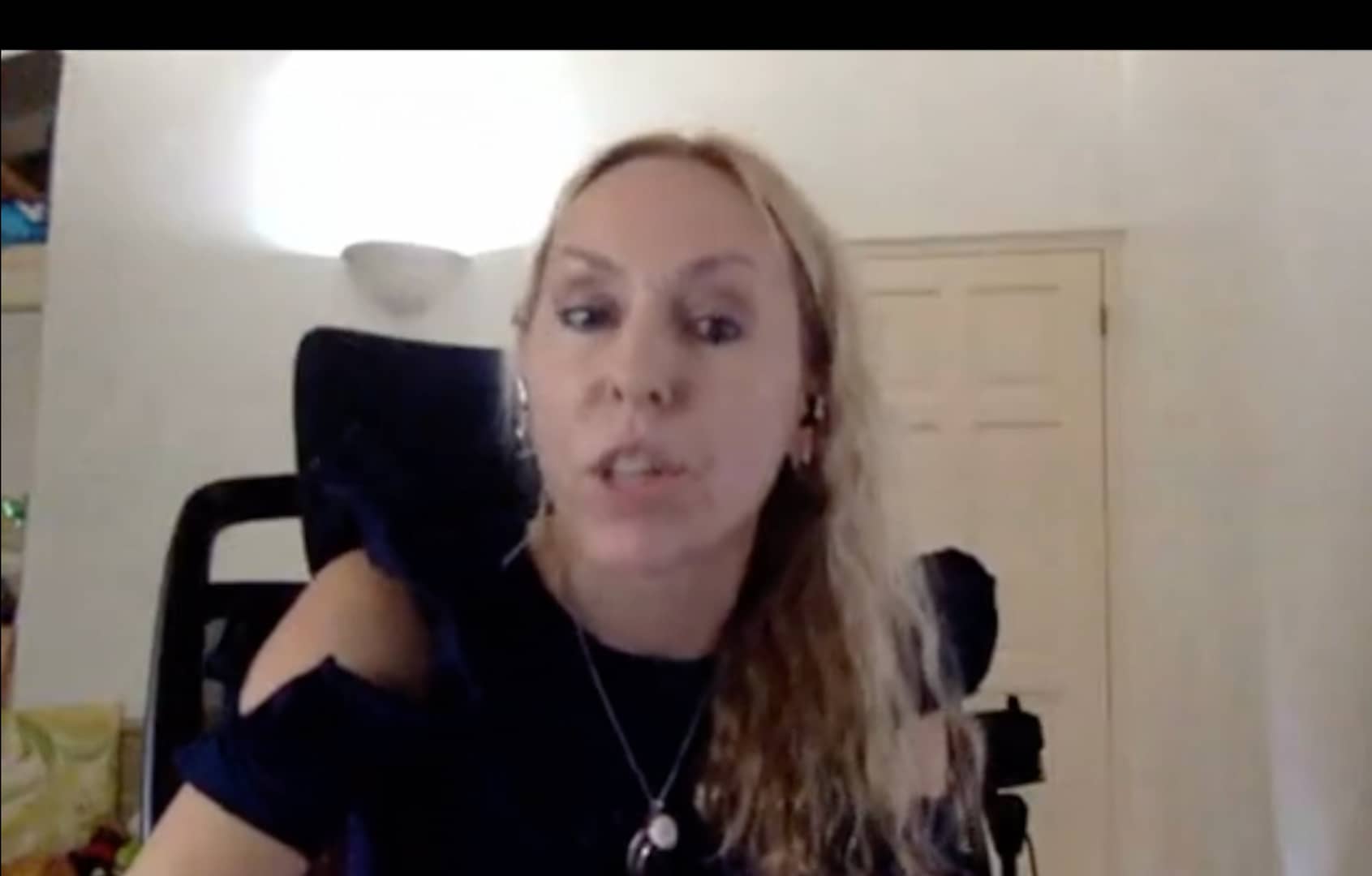
CLICK HERE TO JOIN OUR WHAT’S APP GROUP
See below the full statement issued by the Government of Guyana:
The attention of the Government of Guyana was drawn earlier today to an article published on 14 April 2025 on the BBC News website headlined “Was China the reason Guyana faced higher Trump tariff?” authored by one Gemma Handy who, it would appear, is a freelance journalist based in Antigua and Barbuda.
The author of the article poses the question “why had Guyana been facing a higher levy in the first place?” in connection with the reciprocal tariff announced recently by the US Government.
Ostensibly to find her answer, the author identifies a single Guyanese person to speak on the matter, an anti-Government social-media personality who apparently is a professional beekeeper, anoints him as a political commentator, and proceeds to quote him extensively, including as saying “the planned high tariff showed Washington’s ire … the US is saying ‘if you want our protection you need to chase the Chinese out of your country’”.
The Government of Guyana wishes to draw Ms. Handy’s attention to a previous article published on 3 April 2025 also by the BBC News website under the headline “How were Donald Trump’s tariffs calculated?” in which a detailed explanation is provided on the methodology for calculating the reciprocal tariff. That article concluded that “if you unpick the formula above it boils down to simple maths: take the trade deficit for the US in goods with a particular country, divide that by the total goods imports from that country and then divide that number by two”.
The methodology for calculating the reciprocal tariff was also very helpfully published on the website of the US Trade Representative.
Here again, it was very transparently indicated that the formula for determining the tariff applied to each country is based on the trade balance between the US and the country concerned, and that the formula does not include any variable to capture the relationship of the country concerned with any other country whatsoever.

The Government of Guyana considers that the baseless speculation contained in the aforementioned article by Gemma Handy is mischievous and irresponsible, it falls short of the BBC’s customary high standard of journalistic excellence, and it is particularly egregious given that the methodological basis for the tariff computation has been widely available in the public domain for weeks now and has been published by the BBC News website itself nearly two weeks ago.
We’ve sent Gemma an email asking her if she wishes to respond. Below is her response:
The statement is in response to an article I wrote for the BBC about the impact of US tariffs on the Caribbean and which was published –
with some edits to highlight the Chinese angle – on the BBC website a few days ago.
Unfortunately the statement fails to mention the numerous opportunities the Guyanese government – via several of its departments
– was given to add their comments before it was published.
It is dismaying that they should resort to what has sadly become the modus operandi of too many governments – refuse to comment at the time, and attack the writer subsequently.
Incidentally, the statement also fails to mention that Trinidad – also a major exporter of oil to the US – was not hit with tariffs above the
10% baseline which brings into question why Guyana was.
Finally, the Guyanese government, while directing readers to the US’s calculations justifying the previous 38% tariff, also omits to mention
it too had queried those very same calculations.
Here is the article written by Handy:
Was China the reason Guyana faced higher Trump tariff?
3 days agoShareSave
Gemma Handy
Business reporter
Reporting fromSt John’s, Antigua
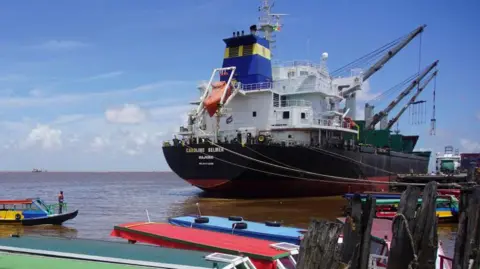
The Caribbean nation of Guyana is breathing a sigh of relief after US President Donald Trump announced a 90-day pause on the introduction of higher tariffs on a number of countries.
Guyana, which is nestled between Venezuela and Suriname on the South American mainland, had been singled out for rates of 38% on many of its exports.
Following Trump’s change in policy, it now faces tariffs of only 10% – the same as all countries apart from Canada, China and Mexico.
But why had Guyana been facing a higher levy in the first place?
Guyanese political commentator Francis Bailey says the country is caught in a geopolitical battle between the US and China. Or more specifically – Washington objects to Beijing’s “very strong foothold” in Guyana.
Recent years have seen billions of dollars of investment in Guyana by Chinese entities, in everything from roads and hospitals, to hotels and shopping centres. And a crucial new bridge linking the capital Georgetown to the western region of Demerara-Mahaica is currently under construction by a Beijing-based company.
For its part, the US continues to be happy to buy Guyana’s key exports of crude oil, gold and bauxite, which is the ore from which aluminium is extracted. These were all to be exempt from the planned 38% tariff, which instead would have hit Guyana’s fishing and sugar industries.
The US also backs Guyana in its territorial dispute with Venezuela over the vast Essequibo region that forms the western two thirds of Guyana. During a visit to Georgetown in March, Secretary of State Marco Rubio warned Venezuela of “consequences” if it were to use force against Guyana.
But the planned high tariff showed Washington’s ire, says Mr Bailey. “I think the reason we had been given such high tariffs is to apply pressure on Guyana.
“The US is saying, ‘if you want our protection you need to chase the Chinese out of your country’. Trump is a very transactional president – and Guyana is in a very precarious position against its sabre-rattling adversary Venezuela which has been ramping up acts of aggression.”
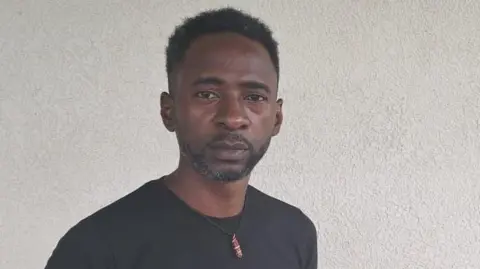
The Guyanese government did not respond to requests for comments. The country, once one of the poorest nations in the western hemisphere, and a former British colony, has been enjoying a surge in wealth since it first discovered oil in its territorial waters in 2015.
Last year it exported $3.13bn (£2.4bn) of crude oil to the US, according to United Nations figures.
Across the Caribbean all countries now face a 10% tariff on their exports to the US. However, it is the price impact of Trump’s global tariffs on what they import from the US that is of most concern.
This is because the Caribbean’s love for, and reliance on, US products is immediately apparent when you glance at a High Street or supermarket shelf across the region. In fact, some islands are said to import as much as 70% of their consumer goods from their North American neighbour.
And with American goods that rely on overseas raw materials or components set to go up in price, this will inevitably be passed on to consumers in the Caribbean.
Also, much of what Caribbean nations buy from other countries around the world comes to them via the US.
So with the White House now hitting Chinese goods coming into the US with tariffs of 125%, Chinese items that are then reexported to the Caribbean should see price hikes of a similar amount. And by around 10% for goods from other countries that arrive via the US.
With already ever-increasing shipping costs in the Caribbean, and high local import duties causing exorbitant prices in a region beset by low wages, the impact of Trump’s tariffs could be profound and keenly felt.
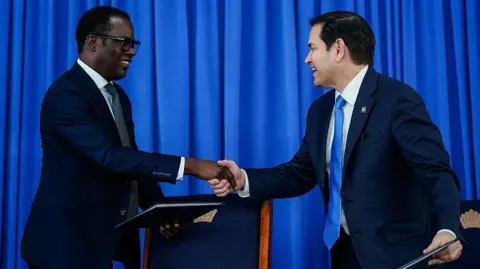
In Antigua and Barbuda, interior designer Carissa Warner tells the BBC that 70% of her materials are imported from the US, and 20% from China.
“Some of my projects are on hold while we wait to see what happens,” she explains. “I am extremely worried from a business aspect but also just as a local consumer.
“I’m so worried about the cost of food I have been looking online for pots to start growing fresh produce. I don’t think people realise the impact it will have on us.”
Ms Warner believes one way Caribbean governments could ease the squeeze on their people is by lowering their own import duties, which are partially calculated using a percentage of an item’s cost.
Antigua and Barbuda’s Prime Minister Gaston Browne has dubbed global tariffs “extremely worrisome” and is urging citizens to “buy smarter and buy local”.
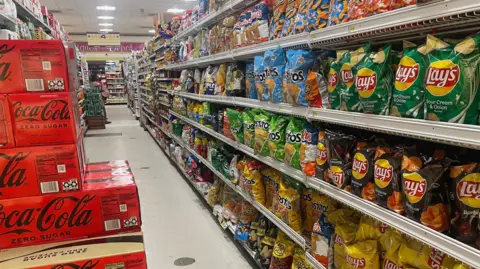
Trump’s tariffs come as the Caribbean is already grappling with a confluence of harsh economic conditions from the cost of cleaning up after frequent natural disasters like hurricanes, to the aftereffects of the Covid pandemic.
Antigua and Barbuda’s ambassador to the US, Sir Ronald Sanders, says that the US has long enjoyed a trade surplus with most Caribbean countries.
“For decades, we have helped sustain American prosperity by collectively importing far more from the United States than we export,” he says.
“The problem we have created for ourselves is that we have been dependent on the US market for such a long time and have not sought to diversify into other markets.”
As for the 10% tariff on Caribbean exports to the US, Sir Ronald says: “Any loss is not a good thing for our small economies, but the 10% that we face is not going to disrupt our goods from going to the US market.”
The Caribbean islands’ small market sizes, high labour costs and remoteness from principle markets has kept their manufacturing sectors relatively modest. Their exports include many niche products like specialist rums and indigenous foods such as ackee, a fruit from Jamaica.
“These kinds of products are all orientated to a certain kind of market and will not face any competition because the US does not produce them, and the countries that do face their own tariffs,” Sir Ronald continues.
Exacerbating worries in the Caribbean are potential additional taxes on Chinese-built ships entering US ports of up to $1.5m per docking. This idea was mooted by the White House in February.
Many fear that will aggravate freight costs in the Caribbean, and lead to further hikes in the price of everyday goods, given the large volume of items sold in the region that are manufactured in China.
Sir Ronald adds that tacking the problem of an overreliance on the US “can only come from diversifying the market, but that’s not an overnight achievement”.
He adds: “It’s not as easy to set up new markets as people think. It’s not governments who control trade; it’s the private sector. And much of what we buy will still come via the US.”
Many Caribbean leaders feel the best strategy to thwart the fallout from tariffs is to negotiate as a bloc.
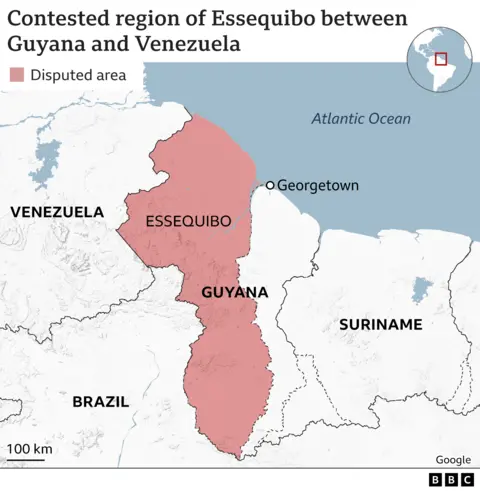
Mia Mottley, chair of the intergovernmental group Caricom, said the region was facing the most challenging of times since its 15 member states gained independence several decades ago.
“We are working and will continue to work to become more self-sufficient, but… this trade war will mean higher prices for all of us,” she said in a recent statement.
Ms Mottley added that it was vital to redouble efforts to “invest in Caribbean agricultural production and light manufacturing”.
“We must build our ties with Africa, Central and Latin America, and renew those ties with some of our older partners around the world, in the United Kingdom and Europe, and in Canada. We must not rely solely on one or two markets.”
Ms Mottley, who is also the prime minister of Barbados, is calling for Washington to “work with” the Caribbean to keep prices down.
She added: “To the United States, I say this simply: ‘We are not your enemy. We are your friends’.”
CLICK HERE TO JOIN OUR WHAT’S APP GROUP
CLICK HERE TO JOIN OUR WHAT’S APP GROUP
CLICK HERE TO JOIN OUR WHAT’S APP GROUP
CLICK HERE TO JOIN OUR WHAT’S APP GROUP
CLICK HERE TO JOIN OUR WHAT’S APP GROUP
Advertise with the mоѕt vіѕіtеd nеwѕ ѕіtе іn Antigua!
We offer fully customizable and flexible digital marketing packages.
Contact us at [email protected]
















Cannot take Gemma serious. She failed to report that story about Algernon Watts in the Daily Observer. Guess she put her paycheck above her journalistic integrity. Anyway it’s a good thing ANR and other news outlets reported it:
https://antiguanewsroom.com/marshall-says-serpent-is-a-shame-to-the-farming-community-with-26-acres-of-abandoned-farm-land/
At the same time, you folks are condemning Observer and Crusader for reporting the Alfa Nero matter which is of National concern. You can’t eat your cake and still have it.
What journalistic integrity? “People” like Gemma would not last a half hour if given a chance to work way she ce from. It’s on A tigua, land of the no-quality poor quality journalists, where a foreign accent serves as an effective cover for ordinary, dunce nobodies posing as journalists. Antigua is a most fertile breeding space for especially anti-government propaganda specialists coming in as refugees seeking safe haven.
A dent in her credibility??
Pretty much the best Journalist in the Carribean, the reason she is regularly featured on the BBC. Of course the notoriously corrupt Guyanese government will make all sorts of false claims to try to muddy the waters, just lucky we have a journo of her calibre prepared to speak the truth.
Your party has such a great track record supporting free press and journalism in this country right? From ZDK, to ABS, to Caribbean Times to Pointe FM right? You are a pathetic man. Look after your health as you age and get more tape for your car. Your generation has retarded the development of this nation like everyone other failed Black post colonial society whose independence and freedom parties never embraced full democracy and descended in corruption patronage and depravity.
@Faithfull national, as usual you speak with disdain toward the press that your rancid Labour Party does not control with its grotesque tentacles of patronage victimisation and corruption. To you, a good journalist is anyone at ABS and Pointe FM who gets the government version, only the government version, and publishes it as the irrefutable truth.
You have spent your career being part of the Labour Party assault of free speech and the free press in this country through your lying public appearances, your attacks on journalists, and your support for your party’s efforts to silence and sideline opposition and free media. You are pathetic.
I think what’s really bothering you deep down in your soul is that as you age, you realise that despite all the bullshit you told yourself all these years about Labour being the salvation of the country, the country is still an underdeveloped stinking shit heap with poverty, ghettos, poor planning, maladministration, and a lack of opportunity. So you try to find escuses and others to blame – the opposition, the journalists, the Barbuda people who don’t support Labour – all your political enemies are responsible for Antiguas failures, not you, who have ruled this country for decades and decades. Sad.
You’ll probably go your final rest and they won’t have a spot to bury you due to the overcrowding in the cemetery and the complete incompetence of the government in designating ans opening a new one. Sad.
Maube they put a bust of you next to your lord and saviour, VC Bird on Market Street amidst the filth and rot and stench where your likeness would fit it nicely. Better yet, they should build a statue of Gaston Browne and put your face in between his ass cheeks where your face normally is most of the time.
An ounce of self respect might have allowed you to be more of an asset to your country and not be such a nasty old fart.
@Faithful national #1
You have a point. Black Antiguan frighten as soon as they hear a us or uk accent
I smell indian racisms here against the black afro Guyanese, if it was a white or indian political commentator that criticism from the president would never happen, even the political commentator is relegated to just someone raising honey bee’s, but I find him on the right track of thinking entrepreneurial and should have been the president of Guyana and it’s oil resources to do a better job than the present government, it seems as though there is a system of bringing all journalist under the control of main stream media control, so anyone thinking outside the box is castigated, trump tariff been greater on Guyana is to allow the white American corporation that owns the oil in Guyana in quotes as stated ” own” because Guyana will never benifit like these corporation. and the tariffs will reduce the income of Guyana, because even if the white corporation pays more to the USA government in tax they are all Americans doing whatever it takes to improve their sovereign nation economy, but does Guyana or any small island in the Caribbean has that capacity to create economic benefits for its people?
Comments are closed.